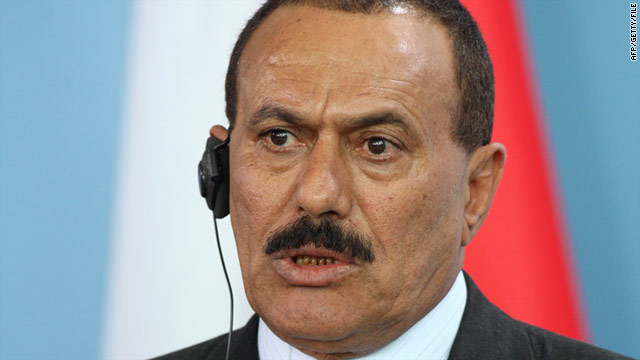 Tribal fighters took control of a top Yemeni city on Tuesday, a setback for an embattled government whose wounded president is hospitalized in Saudi Arabia.
Tribal fighters took control of a top Yemeni city on Tuesday, a setback for an embattled government whose wounded president is hospitalized in Saudi Arabia.More than 400 tribal gunmen took over Taiz in southwest Yemen, witnesses there said.
Government forces have been regrouping in an effort to re-enter the city. Yemen's government has faced international criticism for excessive use of force against anti-regime protesters and the deaths of anti-government demonstrators in Taiz.
Meanwhile, President Ali Abdullah Saleh was in Saudi Arabia Tuesday, recovering from burns over 40% of his body and a collapsed lung, a U.S. government official briefed on the matter said.
Whether he will return to Yemen remained uncertain.



RELATED TOPICS
Saleh was wounded Friday in an attack at his presidential compound. An Arab diplomatic source with knowledge of Saleh's condition said one shrapnel wound was 7 centimeters (2.75 inches) deep.
Fighting between government and tribal forces has been raging in the capital of Sanaa, where thousands of anti-government protesters have been pressuring Saleh to give up power since January. And there has been unrest elsewhere.
At least 15 people were killed in Abyan Monday night and Tuesday morning in clashes between Islamic militants and security forces, according to a security source in Abyan.
Al Qaeda in the Arabian Peninsula has a presence in the southern province of Abyan, a U.S. official said. It's also home to an Islamic militant movement that has targeted government troops in recent days.
The Abyan dead include nine soldiers, four militants and two civilians in Zinjibar and other suburbs in the province, according to the source, who asked to not be named because he is not authorized to speak to the media.
There was also violence along the Saudi-Yemeni border, where there have long been concerns of infiltration by militants.
A man trying to cross into Yemen from Saudi Arabia early Tuesday fatally shot two security officers and wounded another, the state-run Saudi Press Agency said Tuesday.
The man, described as an "infiltrator" who tried to cross the metal-and-sand barriers at the border, fired at the security officers when they approached him, the agency said. Security personnel tracked the man and he was killed in an exchange of fire, it added.
The turmoil in Yemen peaked Friday, when a mosque in Saleh's presidential compound was attacked. Yemen's state-run news agency SABA, citing a source in Saleh's office, reported last week that three guards and an imam were killed.
Western diplomats said the attack came from a bomb. Yemeni investigations are "focusing on what happened inside the mosque," not a rocket or mortar attack, diplomats said Monday. One diplomat said the attack was not a suicide bombing and that the Yemeni investigation was ongoing.
The description of the attack as a bombing differs from what a Yemeni official told CNN last week. The official, who asked not to be identified, said that Saleh was in the mosque when two "projectiles" were fired during Friday prayers.
Supporters of Sadeq Al-Ahmar, leader of the Hashed tribe and an opponent of the Yemeni government, were suspected in the attack.
In response, Yemeni security forces shelled Al-Ahmar's home Friday, killing 10 people and wounding 35 others, according to Fawzi Al-Jaradi, an official with the Hashed tribal confederation.
After Saleh was taken to Saudi Arabia for treatment, the tribal leader and Vice President Abed Rabbo Mansour Hadi -- Yemen's interim leader -- agreed on a cease-fire, said Abdulqawi Al-Qaisi, spokesman for the Hashed leader.
Yemen's largest opposition bloc has vowed to prevent Saleh from returning.
"The Yemeni people will do all in their power to not allow Saleh to re-enter the country," Joint Meeting Parties spokesman Mohammed Qahtan said Sunday.
A U.S. government official said Monday he could not imagine the Saudis letting Saleh return. He said it was critical that the Saudis press Saleh to accept a Gulf Cooperation Council deal offering him immunity in exchange for stepping down.
Saudi state-run Ekhbariya television reported Monday that Saleh had undergone two operations in Saudi Arabia and would return to Yemen after he recovers.
A U.S. official told CNN Monday that the unrest makes U.S. counterterrorism efforts in Yemen "more difficult."
"We rely on the Yemeni government as partners," the official said. "The more the government is distracted by the political unrest, the more difficult it is for us."
The Yemeni government has had a "big impact on acquiring information on AQAP," the official said, referring to al Qaeda in the Arabian Peninsula. "If that information flow slows or stops, it inhibits our ability to gather information."
No comments:
Post a Comment